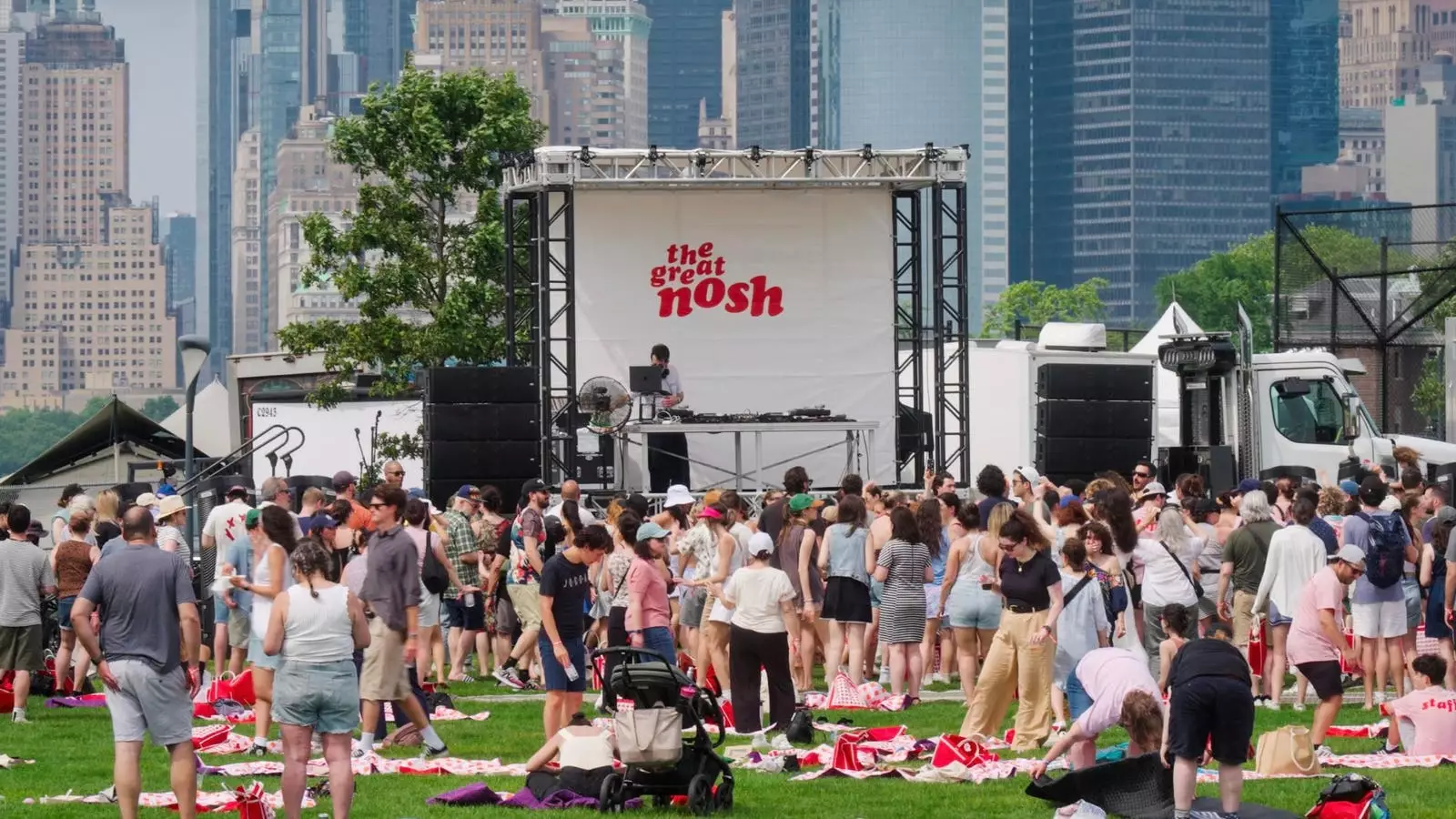In a city as dynamic and diverse as New York, where cultural melting pots are commonplace, the inaugural Great Nosh event emerged as a refreshing celebration of Jewish culinary heritage. Hosted on Governors Island, this festival not only showcased an array of delectable dishes but also redefined how food functions as a powerful medium for storytelling, identity, and communal bonding. By transforming what could have been a straightforward food festival into an immersive cultural experience, organizers created a space where tradition and innovation coalesced amidst stunning views of the Manhattan skyline and the Statue of Liberty. The event became a testament to the capacity of food to transcend mere sustenance, emerging as an emblem of resilience, pride, and shared history.
The success of Great Nosh was evidenced not only by its impressive turnout of over 2,000 attendees but also by the palpable sense of joy and togetherness that permeated the festival grounds. The organizers, led by Naama Shefi—an esteemed cookbook author and founder of the Jewish Food Society—crafted an experience that went far beyond typical culinary fare. Instead, they curated a compelling narrative of Jewish culture, emphasizing its diversity, adaptability, and deep roots in global traditions. Participants could indulge in a spectrum of flavors—from schnitzel-and-chips from Dame, a beloved seafood spot, to Junior’s classic black and white cookie cheesecake—each plate telling its own story of migration, adaptation, and community.
What set this event apart was its emphasis on interaction and education. Cooking demos led by prominent personalities like Gail Simmons and Pati Jinich, and hands-on workshops on challah braiding and pickling, fostered a sense of active participation. These activities underscored the belief that food is a living archive; a vessel carrying stories across generations and borders. It was an inspiring reminder that culinary traditions are not static but are continuously evolving, shaped by cultural exchanges and personal narratives.
Food as an Embodiment of Identity and Resilience
At its core, Great Nosh encapsulated a powerful message: food is a universal language that can bridge divides and foster a deeper understanding of cultural identities. Naama Shefi passionately articulated this perspective, emphasizing that each recipe holds a story—about how communities survive, celebrate, mourn, and love. The event’s arrangements highlighted the symphony of Jewish culinary diversity—from European influences to Middle Eastern staples—highlighting how migration has enriched Jewish cuisine.
One of the event’s most captivating moments was the introduction of dishes like the roti reuben—a delightful fusion pairing Katz’s Deli’s classic Reuben ingredients with Thai Diner’s inventive flavors. Such culinary crossovers embody what Shefi describes as a “borderless” food culture, where traditions are not preserved in isolation but are interconnected and alive. The event promoted conversations around these fusion dishes, which sparked curiosity and challenged monolithic perceptions of Jewish food. It was a reminder that cultural identity is fluid, living, and continuously rewritten by each generation and culinary experiment.
The festival also exemplified a broader societal truth: the act of coming together around shared tastes fosters open dialogue and mutual appreciation. A first-timer trying sabich—a traditional Iraqi-Jewish eggplant sandwich—felt a sudden connection to stories of immigration and resilience. Moments like these reaffirm that food acts as a catalyst for empathy and cultural exchange, especially in a city as multifaceted as New York.
Reimagining Jewish Culture in Contemporary Context
Organizers deliberately positioned Great Nosh as more than a mere celebration; it was a statement that Jewish food, with its global and seasonal nuances, deserves prominent recognition. The event’s pop-up pavilions presented an eclectic mix of culinary interpretations, many inspired by NYC’s vibrant food scene. Chefs collaborated across borders and backgrounds, creating dishes that honored tradition while embracing innovation. It was less about preservation and more about evolution—an acknowledgment that culture is not static but a living entity that adapts to new environments and perspectives.
This approach reflects a conscious effort to challenge stereotypes. Too often, Jewish cuisine is pigeonholed into a narrow, monolithic image. The festival’s diversity—and the variety of dishes and stories showcased—aimed to dismantle this misconception. Attendees learned that Jewish culinary tradition is as broad and complex as the communities that uphold it. From Eastern European pickling workshops to Korean-Jewish fusion bites, Great Nosh underscored that Jewish food is a reflection of a rich tapestry of histories, migrations, and innovations.
Naama Shefi emphasized that the true measure of success lies in sparking conversations, creating connections, and broadening perspectives. It was about inviting people to experience Jewish culture through a delicious lens, encouraging curiosity, and fostering pride. The event’s celebratory and inclusive ambiance positioned it as a blueprint for similar cultural festivals elsewhere—an assertion that food-centric events can serve as powerful tools for community building.
Looking Toward a Future of Cultural Celebrations
The enthusiasm surrounding Great Nosh hints at a vibrant future for similar gatherings, not only within New York but potentially in other major cities. Shefi’s aspiration for the event to become an annual fixture and expand beyond local borders speaks to an understanding that food is a universal language with the power to forge new pathways of understanding and pride.
The event’s final act—a DJ set by Grammy-winning artist Mark Ronson—symbolized the blending of tradition with contemporary culture. It captured the essence of a community rooted in history yet boldly embracing the future. As interest continues to grow, what remains clear is that food festivals like Great Nosh are more than events—they are declarations of cultural identity, resilience, and unity.
In a world often fractured by division, Great Nosh offers a potent reminder: when communities come together to share stories through food, barriers diminish, and bridges are built. This festival exemplifies how culinary traditions can serve as conduits for understanding and pride, rekindling a collective sense of identity amidst a rapidly changing cultural landscape.

